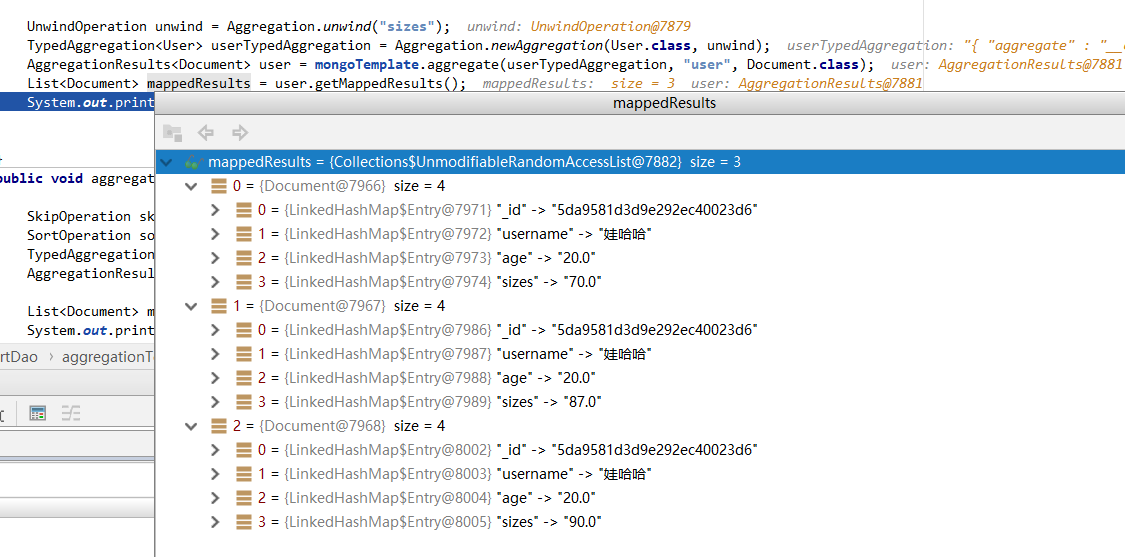- find
- mongoTemplate.find(Query query, Class<T> entityClass )
- 返回值 List<T>
- 实例:List<User> users = mongoTemplate.find(new Query(Criteria.where("age").is(20).and("username").is("zhangsan")), User.class);
- mongoTemplate.find(Query query, Class<T> entityClass,String Collectionname )
- 返回值 List<T>
- 实例:List<User> users1 = mongoTemplate.find(new Query(Criteria.where("age").is(20).and("username").is("zhangsan1")), User.class, "user");
- mongoTemplate.findAll(Class<T> entityClass)
- 返回值:List<T>
- 实例:List<User> all = mongoTemplate.findAll(User.class);
- 代码示例:

- mongoTemplate.findAll(Class<T> entityClass,String Collectionname)
- 返回值:List<T>
- 实例:List<User> all = mongoTemplate.findAll(User.class,"user");
- mongoTemplate.find(Query query, Class<T> entityClass )
- Aggregation
- Aggregation.project(String... fields)
- 返回值:ProjectionOperation
- 实例:ProjectionOperation project = Aggregation.project("age", "username");
- Aggregation.match(Criteria criteria)
- 返回值:MatchOperation
- 实例:MatchOperation match = Aggregation.match( Criteria().where("age").is(20));
- Aggregation.group(String... fields )
- 返回值:GroupOperation
- 实例:GroupOperation group = Aggregation.group("username","age").sum("age").as("count");
- 代码示例:多字段分组

- 代码示例:单字段分组求和

- 代码示例: 多字段分组求和

- Aggregation.limit(long maxElements)
- 返回值:LimitOperation
- 实例:LimitOperation limit = Aggregation.limit(2);
- 注释:只查询集合中的几个文档
- Aggregation.sortByCount(String field)
- 返回值:SortByCountOperation
- 实例:SortByCountOperation sort = Aggregation.sortByCount("age");
- 注释:查询结果会按照age排序,并计算每个age的个数.
- 代码示例:

- Aggregation.skip(long maxElements)
- 返回值:SkipOperation
- 实例:SkipOperation skip = Aggregation.skip((long)2);
- 注释:跳过集合中前几个文档。
- Aggregation.sort(Direction direction, String... fields);
- 返回值:SortOperation
- 实例:SortOperation sort = Aggregation.sort(Sort.Direction.DESC, "age");
- Aggregation.limit(long maxElements)
- 代码示例:

- Aggregation.unwind(String field)
- 返回值:UnwindOperation
- 实例:UnwindOperation unwind = Aggregation.unwind("sizes");
- 注释:会查询出只有该字段的数据.
- 代码示例:

- Aggregation.newAggregation(Class<T> type, AggregationOperation... operations)
- 返回值: TypedAggregation<T>
- 实例:TypedAggregation<User> userTypedAggregation = Aggregation.newAggregation(User.class, skip,sort);
- 注释:将Aggregation各个条件进行组合.交由mongoTemplate进行处理.
- mongoTemplate.aggregate(TypedAggregation<?> aggregation, String inputCollectionName, Class<O> outputType);
- 返回值:AggregationResults<Document>
- 实例:AggregationResults<Document> user = mongoTemplate.aggregate(userTypedAggregation, "user", Document.class);
- Aggregation.unwind(String field)
- Aggregation.project(String... fields)
- count
- mongoTemplate.count(Query query, Class<?> entityClass);
- 返回值:long
- 实例:long count = mongoTemplate.count(new Query(Criteria.where("age").is(20)), User.class);
- mongoTemplate.count(Query query, Class<?> entityClass);
最后
以上就是任性电话最近收集整理的关于Spring-Data-MongoDB中MongoTemplate的使用的全部内容,更多相关Spring-Data-MongoDB中MongoTemplate内容请搜索靠谱客的其他文章。
本图文内容来源于网友提供,作为学习参考使用,或来自网络收集整理,版权属于原作者所有。








发表评论 取消回复